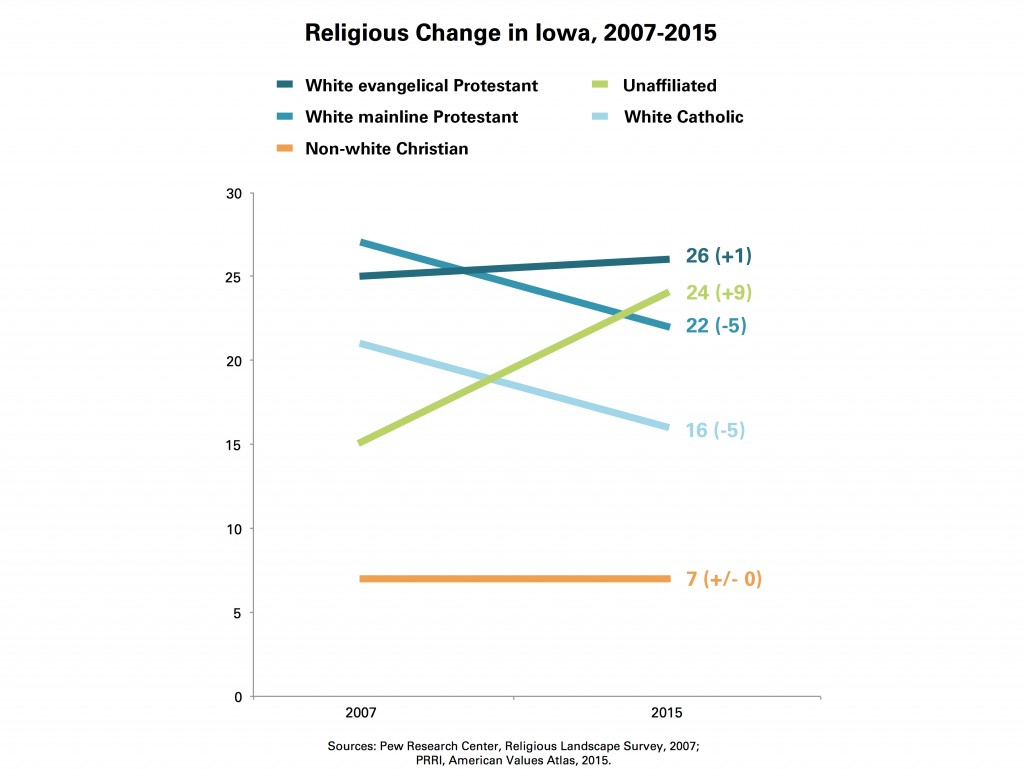White Christian Decline: Changes to Iowa’s Religious Landscape, 2007 vs. 2015
Over the last eight years, Iowa’s religious landscape has changed significantly. The number of Iowans who identify as white and Christian has dropped substantially, although losses vary across religious traditions. Compared to 2007, fewer Iowans today identify as white mainline Protestant (22% vs. 27%, respectively) or white Catholic (16% vs. 21%, respectively).¹ Notably, white evangelical Protestants make up a similar number of the state’s residents today as they did in 2007. At the same time, the size of the religiously unaffiliated population has increased; nearly one in four (24%) Iowans identify as religiously unaffiliated today, compared to only 15% in 2007.
Despite these changes, Iowa continues to have a much higher proportion of white Christians than the U.S. overall, but it now reflects larger nationwide changes and hosts a sizable number of residents who are religiously unaffiliated.
A Religious Realignment?: Religion and Generational Change in Iowa
Iowa’s religious landscape appears poised for a dramatic realignment if current patterns of affiliation hold. Iowa’s youngest adults (age 18 to 29) have a markedly different religious profile than Iowa’s seniors (age 65 and older). Fewer than half of young Iowa adults identify as white and Christian, including white evangelical Protestant (17%), white mainline Protestant (11%), or white Catholic (10%). More than four in ten (42%) young Iowa adults are religiously unaffiliated, while 13% identify as non-white Christians. Iowa seniors, by contrast, are overwhelmingly white and Christian. More than eight in ten (85%) Iowa seniors are white Christians, including roughly one-third (33%) who identify as white evangelical Protestant. Among Iowa seniors, only nine percent are religiously unaffiliated.
Religion and the Political Parties
Despite these shifts, the religious composition of Iowa Republicans is comparable to the religious composition of Republicans nationwide. Nearly eight in ten (78%) Iowa Republicans identify as white and Christian, and the single most common religious identity among Iowa Republicans is white evangelical Protestant. More than four in ten (42%) Iowa Republicans are white evangelical Protestant, 18% are white mainline Protestant, and 16% are white Catholic. Only 16% of Iowa Republicans are religiously unaffiliated.
White Christians also make up a majority of Iowa Democrats, making the group’s religious composition in the state markedly different from that of it nationally. Nearly two-thirds of Iowa Democrats identify as white and Christian, including white evangelical Protestant (21%), white mainline Protestant (21%), and white Catholic (20%). By contrast, among Democrats nationwide, only roughly one-third of Democrats identify as white and Christian.
Staying Steady: Political and Ideological Change in Iowa, 2007 vs. 2015
Despite the significant religious change in Iowa over the past eight years, political party affiliation in Iowa is virtually unchanged from 2007, with nearly half of the state identifying as independent (45%), and with Democrats (27%) only slightly outnumbering Republicans (23%). At the same time, Iowa is becoming somewhat more liberal, with nearly one-quarter (24%) of the state’s population identifying as liberal today compared to 18% in 2007.
¹ The source for all 2015 findings is PRRI, 2015 American Values Atlas; the source for all 2007 findings is Pew Research Center, 2007 Religious Landscape Survey.
Read more about the American Values Atlas’ methodology.
